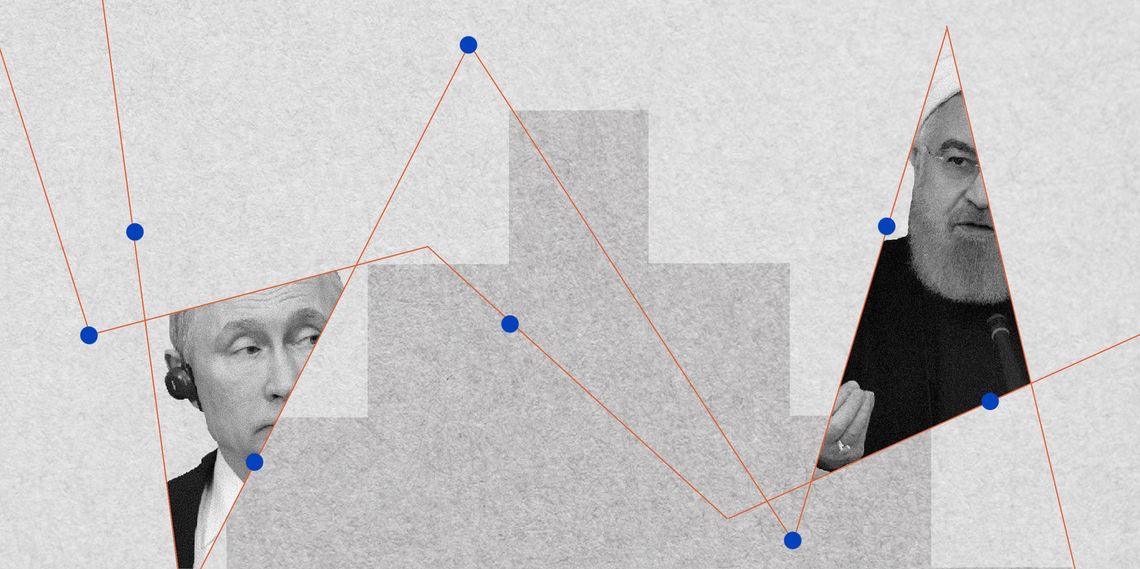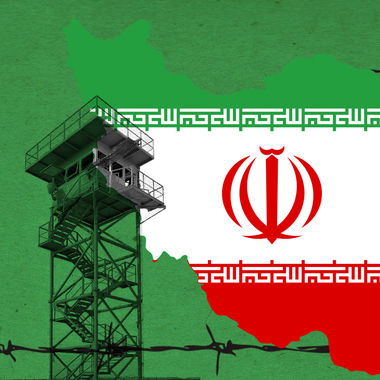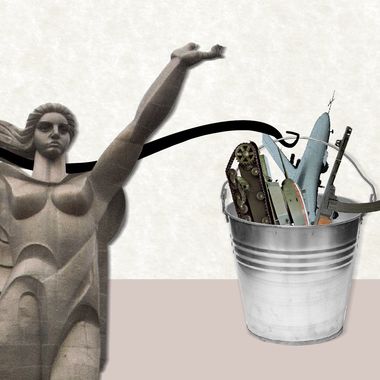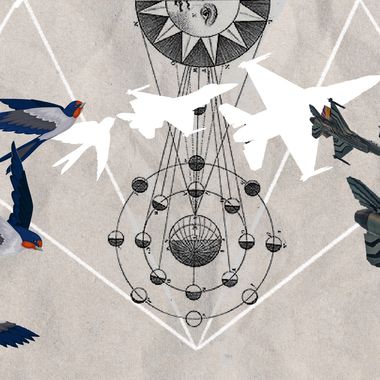
Illustration by Armine Shahbazyan.
The outcome of the 2020 Artsakh War highlighted the vision and strategies of Iran and Russia toward the Karabakh conflict. The increasing role of Turkey, the presence of mercenary-terrorists in the region and the redrawing of factual boundaries have turned Nagorno-Karabakh into a geopolitically unstable region. It is necessary for Moscow and Tehran to revise their approaches, as both have their own interests and role in the conflict.
Tehran: A Balanced Approach
Since 1994, Tehran has taken a balanced approach toward the Nagorno-Karabakh conflict. However, the 2020 Artsakh War brought in new considerations. It is important to understand the unique role and position of Iran in the resolution of the conflict.
Iran, until recently, remained the only country which had a border with all three of the conflicting parties: Armenia, Azerbaijan and Artsakh. The shattering of the status quo by the outbreak of the war brought security issues to Iran. The presence of mercenary-terrorists deployed by Turkey poses a direct threat to Iran through the creation of instability pockets on its northern border. Ankara’s unconditional support for Azerbaijan has accelerated Turkish-Azerbaijani cooperation, which can lead to unpredictable scenarios against Iran’s interests in the region.
The significant Azerbaijani community in Iran (approx. 20 million) and the fact that both Azerbaijanis and Iranians belong primarily to the Shia religion are important factors to consider in their relations. It is also one of the main reasons why Tehran has always supported the territorial integrity of Azerbaijan, while keeping balanced relations with both Armenia and Azerbaijan. This balanced approach is due in large part to Iran’s flexible diplomacy.
Iran has never tolerated the possible presence of trans-regional powers (e.g. United States, NATO) in the region and has made it clear that “the Karabakh crisis should be resolved with the political will of Armenia and Azerbaijan.” At the same time, Iran has supported Russia’s mediation efforts and engagement by other regional powers in the settlement of the conflict. In this context, Russia remains a regional player. Nonetheless, the support of regional powers (in this case, Russia) and clear attempts to prevent the spread of further influence by Ankara brings on all the sensitivity and complexity of the Nagorno-Karabakh conflict.
Iran has a two-dimensional approach toward the Nagorno-Karabakh conflict. The internal dimension has to do with the large presence in northern Iran of those who call themselves Azerbaijani and “feel an affinity with the Republic of Azerbaijan," and the external dimension emphasizes "the importance of security and good neighborliness with northern borders." Tehran is still very careful and is paying close attention to Azerbaijani-Israel military cooperation.
Taking these points into consideration, Iran understands the necessity of having a proactive South Caucasus policy. Before the war, it was deepening relations with Armenia without touching on the Nagorno-Karabakh conflict, while Azerbaijan had active contacts with Western and Arab partners. It was also concerned by Israeli-Azerbaijani contacts and relations which, according to Tehran, could undermine its bilateral relations with Baku. The growing role and control of Turkey over Azerbaijan (through the victory in the war) is pushing Tehran to have a thoroughly-calculated approach to the conflict. For the time being, it seems that Iran will fully support Russian peacekeepers, excluding any potential military presence of Turkey in the South Caucasus. In some way, the reinforcement of Moscow in the region means that the intersection of interests in one case might unite Iran and Russia in greater diplomatic and political struggle against the U.S. (and the West in general) in other regions.
It’s important to understand that, in the 1990s, regardless of Iran’s efforts to stop the First Karabakh War, it lost credibility, specifically in the eyes of the Azerbaijani people.[1] Azerbaijan, having attained success in the latest war thanks to Turkey, will be more loyal to Ankara, which directly threatens Iranian interests in the region. The presence of Armenian troops on Iran’s northern border played into the hands of Iran because a buffer zone between the Azerbaijani community and the Republic of Azerbaijan was maintained.[2] Today, the unstable situation on its northern frontier threatens the national security of Tehran, forcing Iranian authorities to rethink their relations with Baku, not only because of the mercenary–terrorists and unconditional support of Turkey, but also because of the direct links between Baku and the northern Iranian provinces of East Azerbaijan and West Azerbaijan.
Russia: A Dominant Role
The charm of the Russian position in the resolution of the Nagorno-Karabakh conflict consists of good relations with both Armenia and Azerbaijan, and a step-by-step approach to the regulation of the conflict alongside the consensus within the OSCE Minsk Group.[3] The outcome of the 2020 Artsakh War showed the dominant role of Russia both during peace and wartime.
Unlike Iran, Russia has shown its effectiveness as a mediator at least three times: during the First Karabakh War, the 2016 Four Day April War and the 2020 Artsakh War.
Since 1994 Russia has shown willingness to serve as a “mediator and broker rather than support of one of the sides.” The large Armenian and Azerbaijani communities in Russia and deep military and economic cooperation with Yerevan and Baku made the case for Russia to stay neutral.
The presence of Russian peacekeepers in Artsakh proves the dominant role of Moscow in regulating the conflict, while the mediation efforts and actions of France and the U.S. remain of secondary importance.
Moscow remained the main obstacle to Turkey’s goal of establishing its dominance in the region, in spite of its membership in the joint monitoring mission in Karabakh. The main feature of their cooperation is the preference for bilateral coordination without western states.
The total control of Russia in post-war Artsakh seems to show the irrelevance not only of the Minsk Group format per se, but also the U.S. and France separately in the resolution of the conflict. Nothing is mentioned in the Russian-led trilateral agreement of November 9 about the OSCE Minsk Group.
In order to understand why Russia has a dominant role in the conflict generally and post-war peace process regulations specifically, we should look at the following facts: 1) Karabakh Armenians' existence is fully secured by the Russian peacekeeping contingent; 2) Armenia’s borders both with Turkey and Azerbaijan are policed by the Russian 102nd military base and the FSB [Russian Federal Security Service] respectively; 3) Security over the Lachin corridor connecting Armenia to Karabakh is provided by Russian peacekeepers; 4) The POW and captive exchanges is being facilitated by Moscow, which has become first among many future possible dialogues between Yerevan and Baku on certain issues. The large postwar restoration of civilian infrastructure in Artsakh alongside humanitarian loads are being organized and provided by the Russian government.
Russia’s presence also means that Azerbaijan cannot violate the status quo in Artsakh, as it did by initiating the war. Besides its growing authority in the conflict resolution process, Moscow has mechanisms to prevent aggression or violation of current peace processes, which it seems to be employing to de-escalate the recent border incursions into Syunik at Black Lake.
The final status issue of Artsakh, despite Azerbaijani President Aliyev’s statements, isn’t resolved. That leaves room for maneuvering. The occupation of the Hadrut region and the city of Shushi by Azerbaijan gives the Armenian side solid ground to negotiate alongside Russia within the Minsk Group. If negotiated well, Yerevan can demand the return of Hadrut and Shushi, which were occupied by Baku as a result of the war.
Lastly, the Zangezur Corridor, which Azerbaijan is pushing for to pass through the territory of Armenia, would be controlled by the Russian FSB; though, the form of such a potential transportation route is still murky.
By cooperating with the two sides, Russia seeks to provide balance between Armenia and Azerbaijan. By developing cooperation with them, it tries to neutralize the influence of the West.
Russia has played its hand skillfully and has decisively reasserted its role in the region. How Russia perceives any initiative by Turkey remains to be seen. Uncertainties about the future role of Turkey give food for thought. How acceptable will the possible opening of the border between Turkey and Armenia be for Russia? Will Russia tolerate the future development of Turkish-Azerbaijani political-military cooperation in the South Caucasus? Many questions are left to be answered.
Russo-Persian Alignment
Iran and Moscow have their specific roles in the conflict:
1) Geographic proximity, coupled with geopolitical interests, increases the necessity in maintaining a stable region. The pre-war status quo played into their hands because of the stable relations with Armenia and the Armenians of Artsakh. The same is not true for Azerbaijan, due to the mercenaries and the return of Turkey to the region, which is considered by both of them (i.e. Iran and Russia) as a geopolitical rival.
2) The experience in the Syrian Civil War accompanied by mutual interests showed that “Tehran and Moscow have also feared the spread of Sunni fundamentalism and support mutual goals regarding energy routes in the region. In 2016, Moscow obtained permission to use Iranian air bases, such as the Hamadan air base, to launch airstrikes against rebel forces in Syria.” The dialogue continued through the 2020 Artsakh War, when both sides acted in unison.
3) Iran and Russia have maintained their good relations with both Armenia and Azerbaijan. Their constructive and stabilizing role in the conflict, alongside a balanced and equidistance approach,[4] reaffirms the paramount importance of both sides in peacekeeping processes.
4) Both of the parties see each other’s approach to the conflict as mutually-reinforcing. Iran considers the direct interference of Turkey as one of the main threats[5] because it can lead to the presence of great powers in the region (i.e. U.S.) and will discredit Iran’s role as a regional authority. Iran sees the regulation of the conflict only within the internal players of the region.[6] This is unacceptable also for Russia, due to its adversarial relationship with the U.S., not only in the South Caucasus but in other regions as well.
5) The trilateral agreement between Armenia, Azerbaijan and Russia seems to have cooled off the Azerbaijani community both in Iran and Russia, which over the decades have demanded full support for Azerbaijan.
6) Both Russia and Iran have been expressing their adherence to the territorial integrity of Azerbaijan, without clarifying their position on the status of the Nagorno-Karabakh. Thus, room for maneuvering still remains.
7) Moscow and Tehran fully understand that the unblocking of communication, apart from practical difficulties of its implementation, between Yerevan and Baku will lead to the diminishing of their leverage over both parties. It remains uncertain what will happen after a potential change in government in Armenia. Meanwhile, the Aliyev regime, which is at its apogee, has strengthened its hold on power, providing predictability.
8) Iran and Russia seek a more intensive policy in the South Caucasus to deepen their relations with Armenia and Azerbaijan, to grow their influence and leverage.
9) For the time being, there are three blocks: EU-USA, Armenia-Iran-Russia and Turkey-Azerbaijan.
Both parties (i.e. Iran and Russia) understand that a key to dominance in the region is influence over Nagorno-Karabakh and a mediation role in its resolution. For now, Russia holds that position, having the full support of Iran. The outbreak of a new war is less likely in the mid-term; however, some serious geopolitical changes are to come. The main goals for both Russia and Iran are:
1) Preserving the status quo
2) Minimizing the role of the West in the conflict resolution process
3) Keeping an eye on Turkey so as not to let it further flex its muscle in the region.
The recent incursions by the Azerbaijani military into the Syunik and Gegharkunik regions of Armenia show that both Iran and Russia, regardless of their statements about red lines in the confrontation between Yerevan and Baku (the territorial integrity of both), haven't reacted properly. Armenia expected not only the Kremlin's full support, but also the operative reaction of the CSTO. To that end, the statement made by France about providing support, including military support, should push firstly Russia, then Iran to revise their own actions toward this sensitive situation in order not to lose in the complicated geopolitical game in the South Caucasus, which has been drastically changed in the aftermath of the 2020 Artsakh War. The Islamic Consultative Assembly and Chairman of the National Security and Foreign Policy Commission of the Iranian Parliament made it clear once more that any factual redrawing of borders is unacceptable for Iran.
Further escalation between Armenia and Azerbaijan will force Iran and Russia to take more decisive steps to prevent the outbreak of war.
--------------------------------------
[1] Гладкин Ю.А. Ирано-азербайджанские отношения: посредничество Ирана в решении проблемы Нагорного Карабаха // Политические науки. РГСУ. 2018.
[2] Կարապետյան Ռ.Իրանի Իսլամական Հանրապետության դիրքորոշումը Լեռնային Ղարաբաղի հիմնախնդրում | «ԼՂՀ (Արցախի) 25-ամյա պետականության ձեռքբերումներն ու արդի մարտահրավերները» միջազգային երիտասարդական գիտաժողովի նյութերի ժողովածու: 2016թ․, 175-180 էջ.
[3] Маркедонов С.М. Россия в процессе нагорно-карабахского урегулирования.Федеральное государственное автономное образовательное учреждение высшего образования «Российский университет дружбы народов» Кафедра теории и истории международных отношений: 30-летие конфликта в Нагорном Карабахе.С. 22-24.
[4] Агаджанян М. Роль России и Ирана в урегулировании карабахского конфликта // Регион и мир. No 1. 2010. С. 1.
[5] Сидоров Д.А, Нагорно-Карабахский конфликт после Бархатной революции в Армении. Федеральное государственное автономное образовательное учреждение высшего образования «Российский университет дружбы народов» Кафедра теории и истории международных отношений: 30-летие конфликта в Нагорном Карабахе. С 65.
[6] Месамедов В.И. Иран и Нагорно-Карабахски конфликт // Институт Ближнего Востока. 2013.
References:
1. Council of the European Union. Special European Council - 1 October 2020 (Day 1). Access:https://newsroom.consilium.europa.eu/events/20201001-special-european-council-1-october-2020-day-1/128597-3-conference-de-presse-france-partie-3-q-r-20201002
2. Isachenko D. Turkey–Russia Partnership in the War over Nagorno-Karabakh. Stiftung Wissenschaft und Politik, 2020. P 4.
3. Kaleji V. Eight Principles of Iran’s Foreign Policy towards the Nagorno-Karabakh Conflict. Valdai Discussion Club. 2020. Kazemzadeh H. Nagorno-Karabakh and Iranian Public and Foreign Policy // EVN report. 2020.
4. Kirisci K., Ozkan B. After Russia’s Nagorno-Karabakh ceasefire, could Turkey step up next for a lasting peace? // Brookings. 2020.
5. Lengruber V. The Nagorno-Karabakh Conflict: Potential Implications for the Russian- Iranian Relationship // Working Group at the Volgograd Center for International Humanitarian Cooperation. Petropolis Catholic University (Brazil). 2020.
6. Mamedov E. How Iran views the Nagorno-Karabakh truce. Eurasianet news organization. 2020.
7. Povazan M. Russia’s Foreign Policy Towards and Influence on the Nagorno-Karabakh Conflict // Russian International Affairs Council. 2020.
8. Ruptly. Syria: Assad calls Erdogan 'main instigator' of Nagorno-Karabakh conflict.2020. Access: https://www.ruptly.tv/en/videos/20201006-026
9. Sherr J. Russia and Karabakh: A Diplomatic Triumph and Dubious Victory. // The International Centre for Defence and Security. 2020
10.Sushentsov A. The Risk of a Big War in the South Caucasus and Russia's Position. Valdai Discussion Club. 2020. Kirisci K., Ozkan B. After Russia’s Nagorno-Karabakh ceasefire, could Turkey step up next for a lasting peace? // Brookings. 2020.
11.U.S. Department of State. Secretary Michael R. Pompeo at a Press Availability. 14.10.2020. Access : https://www.state.gov/secretary-michael-r-pompeo-at-a-press-availability-14/
12.Агаджанян М. Роль России и Ирана в урегулировании карабахского конфликта // Регион и мир. No 1. 2010. С. 1.
13.В Кремле по инициативе Владимира Путина состоялись трёхсторонние переговоры Президента Российской Федерации, Президента Азербайджанской Республики Ильхама Алиева и Премьер-министра Республики Армения Никола Пашиняна. Итоги встречи на пресс брифинге. Ссылка доступа: https://www.youtube.com/watch?v=neg5cR8F-To&ab_channel=%D0%A0%D0%BE%D1%81%D1%81%D0%B8%D1%8F24
14.Гладкин Ю.А. Ирано-азербайджанские отношения: посредничество Ирана в решении проблемы Нагорного Карабаха // Политические науки. РГСУ. 2018.
15.Краснов О., Джалилов Р. Аналитики указали на отличие интересов Ирана от Турции в разрешении конфликта в Карабае. Кавказский Узел. 2020. Доступ: https://www.kavkaz-uzel.eu/articles/356333/
16.Маркедонов С.М. Россия в процессе нагорно-карабахского урегулирования.Федеральное государственное автономное образовательное учреждение высшего образования «Российский университет дружбы народов» Кафедра теории и истории международных отношений: 30-летие конфликта в Нагорном Карабахе.С. 22-24.
17.Месамедов В.И. Иран и Нагорно-Карабахски конфликт // Институт Ближнего Востока. 2013.
18.Министерство иностранных дел Российской Федерации. Комментарий Департамента информации и печати МИД России относительно переброски иностранных наемников в зону нагорно-карабахского конфликта. 2020. Ссылка доступа: https://www.mid.ru/ru/foreign_policy/news/-/asset_publisher/cKNonkJE02Bw/content/id/4363834
19.Речь Президента Ильхама Алиева на заседании по видеосвязи Совета глав государств СНГ. Ссылка доступа: https://www.youtube.com/watch?v=Jn_b4pNWFn0&t=797s&ab_channel=CBCTVAzerbaijan
20.Сидоров Д.А, Нагорно-Карабахский конфликт после Бархатной революции в Армении. Федеральное государственное автономное образовательное учреждение высшего образования «Российский университет дружбы народов» Кафедра теории и истории международных отношений: 30-летие конфликта в Нагорном Карабахе. С 62-69.
21.Служба внешней разведки Российской Федерации. О ситуации вокруг Нагорного Карабаха. 2020. Ссылка доступа: svr.gov.ru/smi/2020/10/o-situatsii-vokrug-nagornogo-karabakha.htm
22.Կարապետյան Ռ.Իրանի Իսլամական Հանրապետության դիրքորոշումը Լեռնային Ղարաբաղի հիմնախնդրում | «ԼՂՀ (Արցախի) 25-ամյա պետականության ձեռքբերումներն ու արդի մարտահրավերները» միջազգային երիտասարդական գիտաժողովի նյութերի ժողովածու: 2016թ․, 175-180 էջ.
also read
Iran’s Response Following Azerbaijan's Offensive in Artsakh
By Anna Gevorgyan
While Iran's response to the current escalation is neutral and balanced, there are concerns about Azerbaijan's desire for a military solution, Turkey's involvement and the arrival of terrorists in the region.
Geography is Inescapable
By Artin DerSimonian
Following Moscow’s facilitation of the ceasefire agreement ending the 2020 Artsakh War, some are asking whether Armenia should pursue “more Russia or less Russia.” The reality of the matter is that geography is inescapable.
Russia’s Partnership With Turkey and What It Means for Armenia
By Zaven Sargsian
Many assumed that Turkey’s direct involvement in the 2020 Artsakh War and thereby its intrusion into Russia’s “near abroad” would be met with hostility by Russia, or at least vocal condemnation. The reaction was mild, writes Zaven Sargsian.
Implications of the 2020 Artsakh War on Regional Countries
By Hovsep Kanadyan
The 2020 Artsakh War changed the geopolitical picture in the South Caucasus, impacting all the countries in the region. While there were clear winners and losers, some countries both won and lost.
Ending the Blockade: Potential Reopening of Armenia’s Rail Links
By Max Hunder
Armenia’s Government must quickly shape a coherent and powerful vision of what it wants to gain from the transport talks. If they get it wrong, the country is at risk of being outmaneuvered by Azerbaijan and taken advantage of by Russia.








